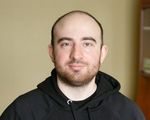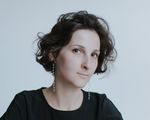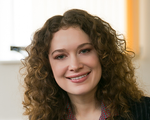About Success Builder
How do you find your place in life? How do you find something to do that both comes naturally to you and makes you happy? The answer is that you have to apply the knowledge you’ve gained from university and from life itself correctly. The Success Builder Project features HSE University graduates who have discovered themselves through an interesting business or an unexpected profession. The protagonists share their experiences and lessons learnt and talk about how they’ve made the most of the opportunities they were given.
Maria Zolotkova, holder of a bachelor’s degree from ICEF, believes that an education in economics provides the foundation needed to manage brands on the market and be a truly effective marketing professional. She currently works as the Vice President for Brand Development at Azbuka Vkusa. In this interview with Success Builder, she explains why FMCG is the best marketing school, what a brand manager does and how to go from being a customer to one of the directors of your favourite store.
At the time you began your studies at HSE, there were no prominent marketing and management programmes in Russia. What other options were there for university-goers?
It has always been important for me to decide for myself where and what I would study. I once even switched schools right in the middle of the academic year. Studying economics was also my decision. At the age of 13, I read in a magazine about a profession called ‘brand manager’. I decided that this was the type of specialist I wanted to become, which meant that I would have to study economics and management. The next steps were clear: I was on the humanities track at school so I switched my focus and began preparing for admission to HSE: this was the best imaginable education in economics.
When I studied what HSE offered, I learned about ICEF—a unique programme where students study in English and earn a foreign diploma along with a Russian one. That got me so interested in the programme that I applied only to HSE. The ICEF bachelor’s programme was very young, with only two graduating classes, but the chance to earn a degree from the University of London became the deciding factor. I decided to major in Economics and Management and was accepted.
I remember that we had many excellent teachers in everything from micro- and macroeconomics to econometrics. But at that time in Russia, you basically couldn’t get an education in marketing. It wasn’t until after I graduated that they began offering the first programmes and high-quality courses.
ICEF is known for giving students a strong academic foundation. Weren’t you tempted to take a more professional interest in science or develop other interests during your studies?
I was never interested in pursuing an academic career: applied subjects seemed more understandable and appealing. If I had doubts about anything, it was only whether to change from in-house to consulting where there might be more ways to apply my academic skills. But my relationship with consulting never went further than the interview stage: I invariably returned to the fact that working on the side of the manufacturer allows you to feel the product you’ve created with your own hands.
I get tremendous satisfaction from my work and enjoy taking on new tasks
This might be because I made the effort early on to find the specialisation that most suited me. Many of my acquaintances have burned out or grown tired of their jobs: there is no spark in their eyes - but there is in mine. You might think that choosing a specialisation means working in a specific job that has particular duties, but marketing is incredibly diverse. It includes product management, creative work, PR and other areas that are closely connected with social and very concrete things. I’ve been learning new things and moving from one industry to another throughout my career. I started out focusing on brand management, but my responsibilities and duties have greatly expanded now.
The marketing profession is changing rapidly. I’m lucky to be able to work in a team with great experts and learn a lot from them. For me, this is the equivalent of taking classes and continuing education courses. But many new disciplines are emerging now, and so it is necessary to gain additional knowledge through training and workshops. At the same time, I’m fully in favour of fundamental education in economics, finance, mathematics and engineering. These are excellent foundations on which many professions, including marketing, can best be built.
Were you able to get a job right away?
I’ve been working since I was 17. I never did a formal internship because I immediately plunged into the family business. It happens that my father is one of the people who built the advertising market in the ‘90s. My brother is in advertising, and he and I grew up in an atmosphere in which commercials, slogans, creativity and all the components of advertising communication were the subject of heated discussion.
My first job was as an assistant on commercial shoots. I did just about everything: I looked for actors and worked as a food stylist, assistant producer and casting director. On the set, I became acquainted with the Publicis United advertising agency and applied for a job with them. I was already working full-time during my final years of study. As soon as I graduated, I moved to Nestle because I wanted to gain experience in product management and marketing in general, whereas the agency specialised in communications.
And how did you get into big-time marketing?
I started at Nestle with a two-year internship as a Management Trainee in marketing, sales, finance and logistics. I learned how business as a whole works and then began going deeper into brand management. In my opinion, this was a very good way to start because it gives you an understanding of what you like to do and where you are effective. After that programme, I moved to The Coca-Cola Company.
Did your degree in finance play a role?
My education was more in economics than finance. The programme for my major included such disciplines as sociology and political science along with accounting and corporate finance. The curriculum turned out to be well balanced.
Throughout their education, students learn to cope with a constant flow of difficult tasks. This teaches them to think and analyse. They learn to apply knowledge in different situations in order to cope with both theoretical and practical tasks. I was taught to dive into unfamiliar areas of knowledge and so it was easier to subsequently switch between industries and specialisations within marketing. ICEF provides powerful training for the brain, just as HSE does in general.
In other words, the university helped build up your soft skills.
Yes, to a large extent. For example, the ability to make structure out of chaos helps me a lot now. In solving any problem, you must first break it down into its component parts, get at the heart of it and understand which actions to take to create a harmonious solution model. An education in economics best prepares marketing professionals for their future challenges. This was the best knowledge I could have possibly received.
Does this mean you rely mostly on your soft skills for marketing?
That, plus professional knowledge and experience. Marketing is a huge area. It involves analytics, performance marketing, CRM, creativity and design, communication, and brand and product management. Of course, it’s impossible for theory to teach all of this in detail; only through experience do you understand how all this should work effectively together and individually. This is why, for me, practical experience factors significantly in success.
To any student who is finishing up his bachelor’s degree and thinking about continuing his education, I would say: try working first
This is because on-the-job training is the best education imaginable. It also helps you figure out what you are interested in and what is relevant on the market—this is important for your further education. For me, additional education makes sense if you are already confident in your choice and want to improve in a certain area or switch your area of expertise. I never considered switching to something else; for me, it always seemed interesting to gain a deeper knowledge of the field I’m already working in and become the best version of myself in it.
I’ve improved my professional and personal skills with the help of various specific courses, conferences and networking. In recent years, I’ve actually been learning from my team because I have the opportunity to attract strong experts to it and solve various kinds of problems together with them.
At Azbuka Vkusa, we are now collaborating with HSE, making a special business game in which students solve business cases—it’s very important to acquaint students with the realities of the industry.
How can the FMCG field be useful for a student to gain experience and start a career?
I worked in FMCG for the first 10 years of my career. Despite the evolution of retail and the growth of IT, the FMCG industry remains the best marketing school for me. It gives me the best grasp of business management tools and processes. FMCG companies have evolved a lot in recent years in terms of digital marketing and analytics, so they are also good for gaining experience in working with data.
What does a brand manager do and which competencies does it require?
I like to think that a brand manager is the same as a business manager, a sort of ‘mini-CEO’, but with one difference: you set the tasks for your team not through direct subordination, but my motivating them. A brand manager solves cross-functional tasks of his product and business, working with the production department, lawyers and the sales team. He or she understands the needs of the client, designs a product-market fit, and develops a product that anticipates needs—execution, packaging, pricing and sales channels.
My education in finance has helped me in brand management. At Nestle, I worked with the finance department to build a new category of P&L—frozen pizza. Brand management is a many-sided profession in which the focus constantly shifts from business to management to communication. Everyone in this profession can find whatever interests them most.
You have also worked for Avito and Yandex, leaders in the Russian IT industry. Why did you choose those companies?
Two things always drive me in my career: instincts and the desire for interesting tasks. When I made the decision to go into IT, I understood that I had already seen a lot in my 10 years in FMCG and wanted to expand my skill set and job duties. It was also clear that IT was a promising field and that my responsibilities would be cutting edge. I decided to move to Avito, and then to Yandex.
How does digital marketing differ from traditional marketing?
Classical marketing is enduring, but changes do occur. We will always look for ways to communicate with the client, try to understand their needs and build product positioning. But there are ever more opportunities for measuring one’s own activities and tools for communicating with the consumer, and they are behind the development of digital marketing.
There are several specialisations in digital marketing. Performance marketing is focused on attracting traffic and converting it into a necessary business-related action such as a client installing a mobile app. When I worked at Yandex.Zen, we tested different approaches to creative design and traffic purchasing that would motivate the consumer to install the app and spend more time on it.
Social Media Marketing (SMM) has also shifted to a data-driven approach in many ways, although it is still a very creative field that allows you to constantly experiment with content. On the other hand, everything is also numbers-driven here because the interaction with users in social networks has long been commercialised. Money is invested in successful content that the brand can then convert into more traffic and more sales.
Influencer Marketing, that involves working with opinion leaders, is another interesting area of digital. Brands collaborate with bloggers who enter into an agreement to promote your product to their subscribers. Every aspect of digital marketing is now associated with data, and working with data is deeply integrated into even the most creative areas of promotion. This makes analytics one of the most important aspects of success in marketing today, and an education in finance and economics develops those skills perfectly.
A few years ago, IT companies primarily had a need for performance marketing, but with the the scaling of IT companies offline, also using classic image advertising tools to promote products. That’s why there is a great demand for marketing professionals from the FMCG sector now.
A marketing professional told me that ‘creativity is dead—data rules’ because it’s all about numbers now.
I don’t agree with this statement. Creativity will always be needed, just as the time will never come when AI can replace human employees.
Algorithms might replace some professions, but they will never replace a thinking, creative person
For example, Google UAC is one of the key tools of performance marketing. These are algorithms that recommend your product to users for whom, in the ‘opinion’ of these algorithms, it is relevant. The only thing a marketing professional can do in this case is to experiment with the data he feeds Google and to tweak the creative part of the ad itself. Thus, the result of the work depends completely on how close you come to hitting the mark with the creative component.
How does Yandex work with AI in terms of marketing?
At Yandex.Zen, the product itself is based on AI, but its value is the most difficult thing to demonstrate. People see AI as simply technology, and many are even afraid of it. It is always important to immediately point out which tasks AI will help a person solve. We proceeded from cool content and people’s interests: everyone has interests, and Zen has content for every taste. In this case, AI connects the material you see with your interests and learns to do it better as you scroll through the feed and view the content.
How do marketing experts fare with the work-life balance?
It’s hard to give a definite answer here. My co-workers have very different workloads and each has a different pace of life. This really depends on the company, the brand and your personal ambitions. Workload has never been a problem for me. Sure, it’s high, but it’s not monotonous and I never notice the passage of time. The workload is higher for some tasks than for others, depending on the area in which you’re working. As a result, I can’t generalise and say that if you work in marketing, you’ll go home every evening at six or that you’ll be at the office all night because both can and do happen. But you always need to find time for inspiration, for developing your powers of observation, for diversion, for yourself, for taking care of your physical and mental health. If your job doesn’t leave time for this, it is worth reconsidering.
Why did you decide to go into retail? What is interesting about the Azbuka Vkusa company?
I decided to switch industries again. In general, the intensity of such changes is like getting a higher education in miniature, but after my move to IT where I worked for five years, it was easier to do. Retail combines everything I love and continue doing. Azbuka Vkusa has tasks related to classical brand management: the development and promotion of a portfolio of the company’s own brands and image-related communications and projects. But there are also digital products that are developing rapidly. In this sense, retail is also starting to live according to the same rules as IT companies. I came to Azbuka Vkusa at the peak of the pandemic, but I didn’t realise how long this whole thing would drag on and what a huge boost it would give to the development of the retail industry.
It was obvious when I joined the company that the brand needed to evolve and, one year later, our team and I have implemented the first rebranding of Azbuka Vkusa in 15 years
This is only the beginning. A lot of work is underway to develop the visual and conceptual parts and the product component. Also, my new role is a mega-challenge in terms of developing leadership skills: I work with a large team of more than 100 people.
The team had to be partially rebuilt as we went, simultaneously with all operations and rebranding. The ability to learn on the job came in handy, as did my leadership training.
It might not be such an important factor in choosing a job for some people, but Azbuka Vkusa happens to be my favourite brand, and this year it turns 25! I am happy to contribute to the brand. It has become something of a cult as one of the few brands that have survived two decades of changes. Azbudka Vkusa has won the affection of a loyal audience I see prospects that the brand and I can bring to fruition. That’s why I’m here.














































































































































